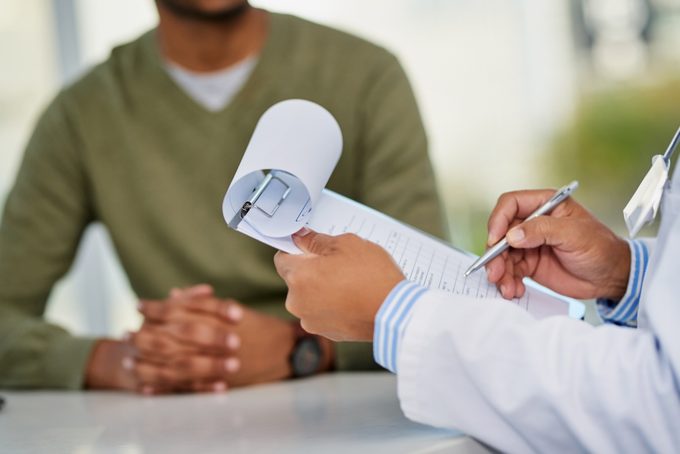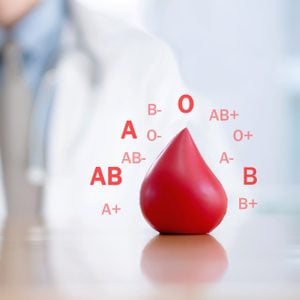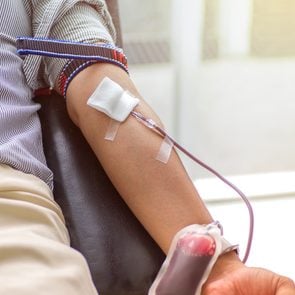How to Find Out Your Blood Type at Home, the Doctor’s Office, and More
Updated: Oct. 10, 2022
If you don't know your blood type, you are not alone. The good news is that there are many ways to find out this powerful health information including DIY home kits that provide results in minutes.
Our editors and experts handpick every product we feature. We may earn a commission from your purchases.
I got an A +!
But before you say congratulations, it wasn’t a stellar grade on a report card or end-of-year project. It’s my blood type, according to an at-home DIY blood typing kit I bought on Amazon—the Eldoncard Blood Type Test (Complete Kit) Air Sealed Envelope, Safety Lancet, Micropipette, Cleansing Swab, to be exact.
And this may not be such great news after all as people with type A blood may be more prone to coronavirus and a more severe course of the illness, along with other conditions, according to a growing body of research. Exactly how our blood type affects Covid-19 risk remains unclear, but there are other reasons you should know your blood type and a handful of ways to find out this important health information. (Here are 9 secrets your blood type can reveal.)
Blood typing: The basics
There are four main blood types and they are A, B, AB, and O. Antigens are a type of sugar or protein molecule on the surface of red blood cells. Type A has the A antigen, B has the B antigen, AB has both the A and B antigens, and O has neither. Once your blood type is determined, you need to find out whether you are positive or negative for the Rhesus factor (Rh), a protein on the surface of red blood cells.
My results suggest that I have A antigens and am Rh-positive. I didn’t know my blood type until I took this test, and as it turns out, most people don’t. Less than 57 percent of Americans know their blood type, according to a survey by Quest Diagnostics, a lab testing facility. FYI: AB negative is the rarest in the U.S., at 0.6% of people. The most common types are O+ at 37.4% and A+, like me, at 35.7%, according to the Stanford Blood Center. (People who lack Rh antigens completely have the rarest blood type in the world.)
How can you find out yours?
Do a home test
Many DIY kits are available online and in drugstores. Ranging in price from $9 to $30, these kits include cards that contain chemicals known as reagents. You prick your finger with a small, sharp instrument called a lancet, place droplets of blood on the card to see where blood clumps, and then match those reactions to a guide. These test for the presence of the antigens and Rh factor. Results are available in less than 3 minutes. The test I ordered got great reviews, and the directions were relatively simple to follow. (There’s even a video to watch if that’s easier to follow). Most experts can’t comment on how accurate these tests are as results most likely depend on your ability to follow the instructions. Some at-home DNA kits also provide information on your blood type along with other heath information.
Hate needles or the thought of pricking your own finger? You may be able to find your blood type with a spit test. So-called “secretors” have antigens in their blood and their saliva. These tests can be expensive, costing around $200, and you must first find out if you are a secretor, which is the first part of the test. A majority of people are, according to research in the February 2016 issue of Journal of Clinical and Diagnostic Research.
Ask for a test at your doctor’s office
Your doctor can screen your blood and determine your blood type during your next visit, but your insurance is unlikely to cover this cost, says Randell Wexler, MD, an associate professor of family medicine and vice chair for clinical affairs at The Ohio State University Wexner Medical Center in Columbus. “I don’t do ABO typing for this reason,” he says. Note that there usually needs to be a specific diagnosis for doctors to order a test, so if there isn’t one, then getting this done at the doctor’s office is not the best way.
Donate blood
If you donate blood—and there are blood shortages now—you will get a blood type test for free, Dr. Wexler says. If you have donated in the past, you should have a donor card with an identification number, and you can call the blood bank to find out your blood type.
In-office testing is a bit more exact as it combines forward typing and reverse typing. The test I used did only forward typing, which looks for antigens and Rh status in red blood cells. Reverse typing also looks at antibodies in your plasma, the yellowish, liquid part of your blood. This double-confirms your blood type because plasma should not contain antibodies—which tag cells for destruction—to your blood type, says Bruce Sachais, MD, PhD, chief medical officer of the New York Blood Center in New York City.
Check your medical record
If you have ever had surgery, your blood type is most likely listed in your medical record, says Robert Glatter, MD, an emergency physician in New York City. Call the record center and ask for a copy, he suggests.
Ask your OB/GYN
If you are pregnant or have been in the past, your obstetrician would have typed your blood as part of your routine prenatal care. In these cases, it’s the Rh factor that matters. “If the mom is Rh negative and dad is Rh positive, it can cause Rh incompatibility and you can get medications to protect the baby,” Dr. Sachais says. If your fetus is Rh-positive and you are Rh-negative and blood from the fetus mixes with yours, your body will attempt to fight it by making anti-Rh antibodies, explains the American College of Obstetricians and Gynecologists. These antibodies can cross the placenta and lead to serious and potentially deadly health problems in a fetus or newborn. These complications can be prevented by knowing your blood type and taking medication, if warranted. Family medicine doctors also often provide prenatal care, too.

Blood type: Knowledge is power
You should know your blood type, Dr. Glatter advises. It can give you a heads up on risks for diseases and conditions and allow you to take steps to lower your risks, he says. For example, people with type A blood have been found to have a higher risk of stomach cancer compared with those with other blood types. “Cutting back on smoking and alcohol use can lower this risk,” he says.
Men with this blood type could be more likely to have a heart attack. Maintaining normal weight, exercising regularly, and eating a healthy diet can help lower this risk, he suggests.
However, not knowing your blood type will not prevent you from giving or getting blood. If you need an emergency blood transfusion, the blood bank will always type your blood first. “In an emergency, everyone gets O negative. We don’t wait for blood typing results,” he says. Type O is the universal donor and can work with all other blood types, according to the American Red Cross.
If you know your blood type, you can make directed blood donations to a family member or friend in need, Dr. Sachais says. You don’t need to know your blood type to donate blood. (But not everyone can donate blood. Here are 14 surprising reasons you may be turned away.)
Keep this information handy, he adds. Many smartphones allow you to add emergency info into your lock screen. “This information can be accessed without logging in and should include emergency contacts, allergies, blood type, and medical conditions,” Dr. Sachais says. “If you don’t have a smartphone, a wallet card is also fine.”




